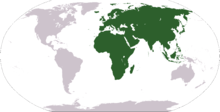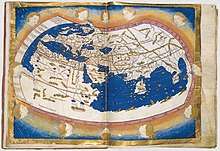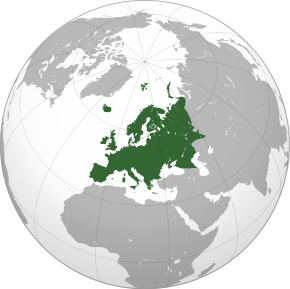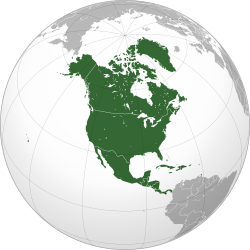Old World
The term "Old World" is used commonly in the West to refer to Africa, Asia and Europe (Afro-Eurasia or the World Island), regarded collectively as the part of the world known to its population before contact with the "New World" (the Americas and Oceania).[1][2]


Etymology
In the context of archaeology and world history, the term "Old World" includes those parts of the world which were in (indirect) cultural contact from the Bronze Age onwards, resulting in the parallel development of the early civilizations, mostly in the temperate zone between roughly the 45th and 25th parallels, in the area of the Mediterranean, Mesopotamia, Persian plateau, Indian subcontinent and China.
These regions were connected via the Silk Road trade route, and they have a pronounced Iron Age period following the Bronze Age. In cultural terms, the Iron Age was accompanied by the so-called Axial Age, referring to cultural, philosophical and religious developments eventually leading to the emergence of the historical Western (Hellenism, "classical"), Near Eastern (Zoroastrian and Abrahamic) and Far Eastern (Hinduism, Buddhism, Jainism, Sikhism, Confucianism, Taoism) cultural spheres.
History
The concept of the three continents in the Old World, viz. Asia, Africa, and Europe, goes back to classical antiquity. Their boundaries as defined by Ptolemy and other geographers of antiquity were drawn along the Nile and Don rivers. This definition remained influential throughout the Middle Ages (see T and O map) and the Early Modern period.
Other names
The mainland of Afro-Eurasia (excluding islands or island groups such as the British Isles, Japan, Sri Lanka, Madagascar and the Malay Archipelago) has been referred to as the "World Island". The term may have been coined by Sir Halford John Mackinder in The Geographical Pivot of History.[3]
The equivalent of the Old World had names in some of its ancient cultures, including Midgard in Germanic cosmology and Oikoumene among the Greeks.
See also
References
- "Old World". Merriam-Webster Dictionary.
- "New world". Merriam-Webster Dictionary.
- See Francis P. Sempa, "Mackinder's World." American Diplomacy (UNC.edu). Retrieved 8 September 2018.
Continents of Earth | ||||||
|---|---|---|---|---|---|---|
| ||||||
| ||||||
Western world and culture | |
|---|---|
| Aspects | |
| History | |
.svg.png)
.svg.png)
.svg.png)
.svg.png)


.svg.png)
_political.svg.png)
.svg.png)
.svg.png)
.svg.png)